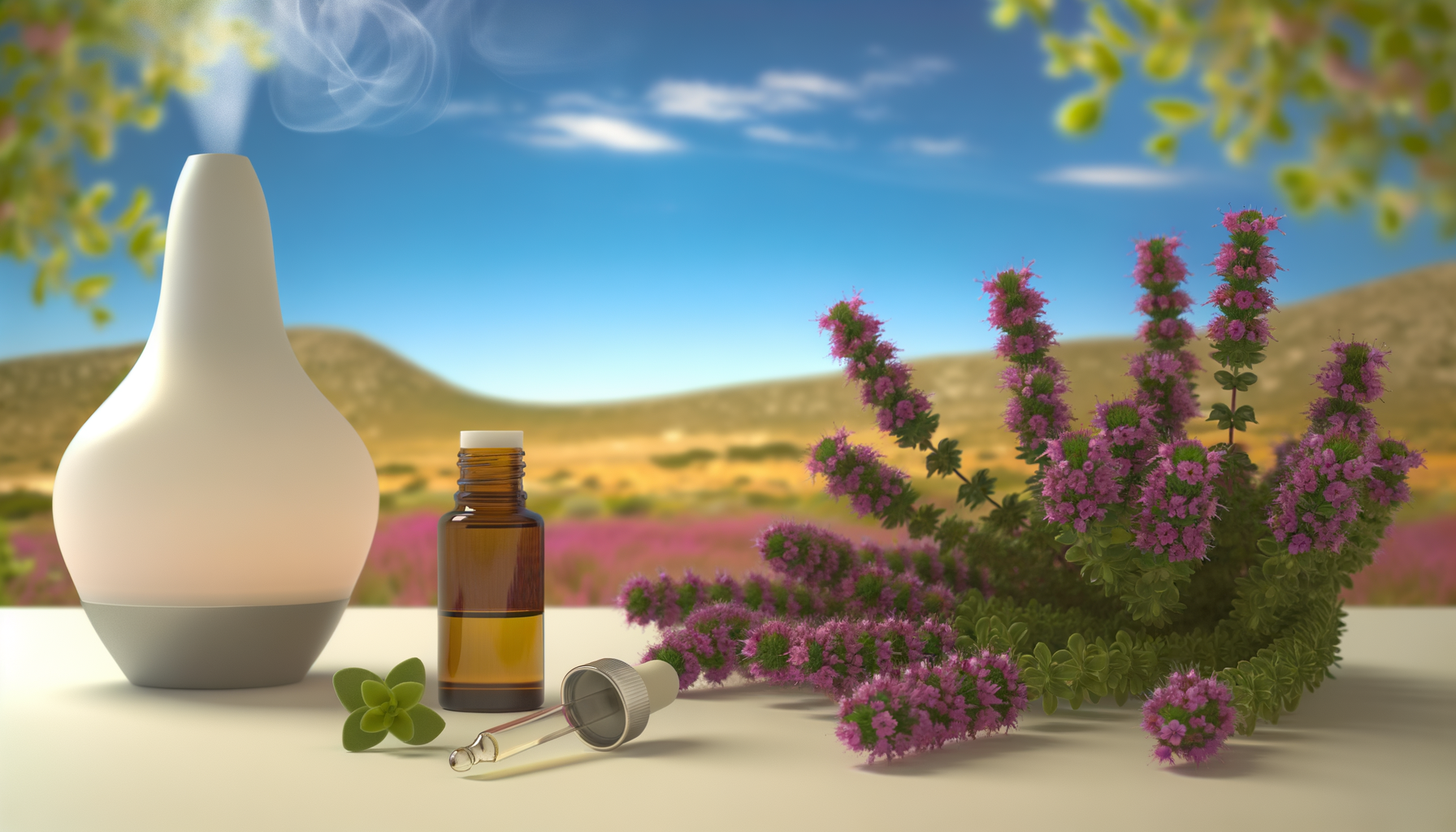Thyme Oil
Thymus vulgaris, commonly known as thyme, is a perennial herb belonging to the mint family Lamiaceae. Native to the Mediterranean region, this culinary and medicinal plant is characterized by its small, aromatic leaves and woody stems. Thyme is not only a staple in the kitchen but also a source of potent essential oil, widely recognized for its therapeutic benefits.
Historical Significance
The use of thyme dates back to ancient civilizations, where it was revered for its medicinal properties. The Egyptians used it in embalming practices, while the Greeks burned it as incense in sacred temples. Thyme was also known to the Romans, who spread its cultivation across Europe. Throughout history, thyme has been associated with courage, bravery, and strength, and it has been used in various cultural rituals and health practices.
Composition and Aroma
Thyme oil boasts a complex chemical makeup, rich in phenolic compounds such as thymol and carvacrol, which are credited with its strong antimicrobial properties. These small, lipophilic molecules readily penetrate lipid barriers, disrupting pathogen cell membranes and inhibiting biofilm formation. The oil’s distinctive warm, herbaceous aroma with spicy undertones makes it a favorite in aromatherapy and perfumery.
Common Uses in Traditional Practices
Traditionally, thyme oil has been used for a myriad of purposes. It has been applied as an antiseptic for wounds, a remedy for respiratory conditions, and a treatment for skin disorders. In folk medicine, thyme oil has been employed to promote digestive health, relieve muscle spasms, and even as a diuretic. Its use in traditional practices underscores the oil’s versatility and enduring therapeutic value.

Bette 100% All-Natural Relaxing Lavender Body Lotion.
Chemical-Free
Your relaxing night time body moisturizer to leave the day’s stress behind. Decompress and wish your body good night with the calming scent of lavender.
Thyme Oil’s Therapeutic Properties
Antioxidant Capacity
Thyme oil, derived from the Thymus vulgaris plant, is rich in a variety of compounds that contribute to its antioxidant capacity. Antioxidants are crucial in neutralizing free radicals in the body, which can cause oxidative stress and damage to cells. The presence of phenolic compounds such as thymol and carvacrol in thyme oil provides it with potent antioxidant properties, helping to protect the body against the aging process and various diseases associated with oxidative stress.
Antiseptic and Antibacterial Effects
One of the most celebrated therapeutic properties of thyme oil is its antiseptic and antibacterial effects. Thyme oil has been shown to be effective against a range of bacteria, including those that cause skin infections and respiratory problems. The active constituents thymol and carvacrol are largely responsible for these effects, making thyme oil a natural choice for disinfecting wounds and preventing infection.
Antispasmodic and Hypertensive Benefits
Thyme oil exhibits antispasmodic benefits, providing relief from spasms in the respiratory system, intestines, and muscular aches due to its relaxant properties. Additionally, studies have indicated that thyme oil can help in lowering high blood pressure, making it a natural hypertensive agent. This is particularly beneficial for individuals suffering from hypertension, as it aids in maintaining heart health and preventing complications such as stroke.
Calming and Hormone Balancing Actions
The calming effects of thyme oil are well-documented, with its ability to alleviate stress and anxiety. This is attributed to its content of carvacrol, which influences neurotransmitter levels in the brain. Furthermore, thyme oil has been found to have hormone balancing actions. It can help regulate menstrual cycles and relieve symptoms associated with premenstrual syndrome (PMS) and menopause. The oil’s influence on hormone balance is particularly significant for women’s health, as it supports the proper functioning of the reproductive system.
Health Benefits of Thyme Oil
Respiratory System Support
Thyme essential oil is a boon for the respiratory system, offering relief from coughs, colds, and sore throats. Its expectorant properties help in clearing out mucus and phlegm, while its antibacterial nature fights the pathogens responsible for respiratory infections. Inhaling thyme oil through steam can significantly alleviate symptoms of bronchitis and other respiratory ailments.
Skin Health and Wound Care
The antiseptic and antibacterial effects of thyme oil make it an excellent remedy for skin health. It accelerates the healing of wounds, cuts, and sores, and can also be effective against skin conditions like acne and eczema. Thyme oil’s ability to cleanse and protect the skin from infections contributes to a healthier, clearer complexion.
Oral Health Maintenance
Maintaining oral health is another area where thyme oil shines. Its antibacterial properties combat the bacteria that cause tooth decay, gingivitis, and bad breath. Thymol, a component of thyme oil, is used in dental products to protect teeth from decay and as a natural mouthwash to ensure a clean and healthy oral environment.
Insect Repellent and Parasite Treatment
Thyme oil is a natural deterrent against insects like mosquitoes, fleas, and lice. Its application can prevent bites and infestations, and it can also be used to treat existing insect bites and stings. Moreover, thyme oil’s vermifuge properties help in eliminating intestinal parasites, making it a valuable addition to parasite cleanse regimens.
Circulatory System Enhancement
As a stimulant, thyme oil boosts circulation, ensuring that blood flows smoothly throughout the body. This can be particularly beneficial for individuals with conditions like arthritis. The oil’s ability to relax arteries and veins also helps in reducing blood pressure, thereby supporting overall heart health and preventing conditions such as strokes.
Psychological and Hormonal Impacts
Stress and Anxiety Relief
Thyme essential oil is recognized for its ability to alleviate stress and anxiety. Its calming properties allow the body to relax, opening up the lungs, veins, and mind to promote proper functioning. Chronic anxiety can lead to a host of health issues, including high blood pressure, insomnia, digestive problems, and panic attacks. Often, these are exacerbated by a hormone imbalance, which thyme oil can help regulate naturally. Incorporating thyme oil into a weekly routine by adding it to bath water, a diffuser, body lotion, or simply inhaling it can significantly reduce anxiety levels and support overall well-being.
Hormone Balancing Effects
Thyme oil has been shown to have progesterone balancing effects, which is crucial since both men and women can suffer from low progesterone levels. Low progesterone has been linked to conditions such as infertility, PCOS, and depression. Thyme oil, with its ability to improve progesterone production, offers a natural solution for hormone-related issues. Research has placed thyme oil among the top substances that have the highest estradiol and progesterone binding capabilities, indicating its potential in naturally balancing hormones within the body. This is particularly beneficial as it offers an alternative to synthetic treatments like hormone replacement therapy, which can have adverse side effects and mask symptoms while potentially causing diseases in other parts of the body.
Menopause and Menstrual Support
Thyme essential oil’s influence on hormones extends to providing support during menopause and menstruation. By stimulating hormone production, thyme oil can delay the onset of menopause and alleviate menopausal symptoms such as mood swings, hot flashes, and insomnia. Additionally, due to its role in increasing progesterone levels, thyme oil serves as a natural treatment for fibroids and can relieve symptoms of PMS. Applying a few drops of thyme oil to the abdomen has been suggested as a method to treat fibroids and ease menstrual discomfort.

Specific Conditions Addressed by Thyme Oil
Respiratory Infections and Common Cold
Thyme essential oil is renowned for its ability to combat respiratory infections and alleviate symptoms of the common cold. Its components, such as caryophyllene and camphene, provide antiseptic properties that kill infections in the respiratory system. Thyme oil’s efficacy in reducing coughing and symptoms of acute bronchitis has been supported by studies, making it a natural remedy for colds without the need for pharmaceutical drugs.
Bacterial Infections and Antibiotic Resistance
With the rise of antibiotic-resistant bacteria, thyme oil presents a promising natural alternative. Its antibacterial properties are attributed to its high phenolic monoterpene content, particularly thymol, which can disrupt bacterial cell membranes and inhibit biofilm formation. This is crucial as biofilms can make microorganisms a thousand times more resistant to antimicrobials. Research has shown thyme oil to be effective against various antibiotic-resistant strains, including MRSA, by reducing biofilm and enhancing the efficacy of conventional antibiotics like vancomycin.
Eczema and Acne
Thyme oil’s antibacterial activity extends to skin health, where it has been found to be a potential natural remedy for acne and eczema. The oil’s ability to kill P. acnes, the bacteria thought to cause acne, and its anti-inflammatory properties make it suitable for topical application. Additionally, thyme oil supports the digestive system and detoxification, which are often linked to skin disorders like eczema.
High Blood Pressure and Stroke Prevention
Thyme oil’s benefits for the circulatory system are noteworthy. It acts as a stimulant, improving blood circulation and reducing the risk of conditions such as arthritis and stroke. By relaxing arteries and veins, thyme oil can help lower blood pressure, making it a natural remedy for hypertension. Its tonic properties also strengthen cardiac muscles and promote proper blood flow.
Fibroids and PMS
Thyme oil has been identified as having progesterone balancing effects, which can be beneficial for women suffering from fibroids and premenstrual syndrome (PMS). By improving progesterone production, thyme oil can naturally treat fibroids and alleviate PMS symptoms. Its hormone-balancing actions also extend to providing relief during menopause, reducing symptoms like mood swings, hot flashes, and insomnia.
In conclusion, thyme oil’s broad spectrum of therapeutic properties makes it a valuable natural remedy for various specific health conditions. Its ability to address respiratory infections, combat bacterial infections, improve skin health, regulate blood pressure, and balance hormones underscores its potential as a holistic approach to health and wellness.
By the way, something for you, a little gift!!!
I am just in the middle of publishing my book. It’s about How women can balance their hormones. One part is about food and diet, of course.
Follow this link and enter your email.
I will send you this part of the book for free once the book is published. It has many concrete, practical tips and recipes and will help you feel better during menopause or times of Big hormonal fluctuations.
Annette, Damiva Lead for Health & Wellness

Practical Applications and Recipes
Homemade Thyme Oil Preparation
Creating your own thyme oil at home is a rewarding and straightforward process. Begin by selecting fresh Thymus vulgaris leaves and allowing them to dry. Once dried, crush the leaves slightly to release their natural oils. Place the crushed leaves in a clean jar and cover them with a carrier oil, such as olive or almond oil, ensuring the leaves are fully submerged. Seal the jar and place it in a warm, sunny spot for about two weeks, shaking it daily. After the infusion period, strain the oil through a fine mesh or cheesecloth, discarding the leaves. Store your homemade thyme oil in a dark glass bottle away from direct sunlight.
Usage in Everyday Life
Thyme oil can be incorporated into your daily routine in various ways. Add a few drops to your bathwater for a relaxing and therapeutic soak, or mix it with a carrier oil for a soothing massage blend. You can also use thyme oil in a diffuser to purify the air and provide respiratory support. For a quick antiseptic, dilute thyme oil with water and use it to clean surfaces in your home.
DIY Personal Care Products
Thyme oil’s versatility extends to personal care products. For a natural mouthwash, mix a drop of thyme oil with water and gargle to maintain oral health. Create a homemade shampoo by adding thyme oil to a gentle, unscented base to help with scalp health. For skin care, blend thyme oil with aloe vera gel for a soothing and anti-inflammatory face mask. Always remember to perform a patch test before applying any new product to your skin.
Hormone Balance Serum Recipe
Thyme oil is known for its ability to help balance hormones. To create a hormone balance serum, mix 5 drops of thyme oil with 10 ml of evening primrose oil, which is rich in gamma-linolenic acid, known to support hormonal health. Add 5 drops of lavender oil for its calming properties and 5 drops of clary sage oil, which is often used to alleviate PMS symptoms. Combine these oils in a dark glass dropper bottle and gently roll the bottle to blend the oils. Apply a few drops of this serum to your wrists, neck, or feet daily, particularly during times of hormonal fluctuations.
Remember, while thyme oil offers many benefits, it should be used with care. Always dilute essential oils with a carrier oil before topical application to avoid skin irritation, and consult with a healthcare professional before using any new treatment, especially if you are pregnant, nursing, or have a medical condition.
Safety, Side Effects, and Interactions
Safe Usage Guidelines
Thyme oil, known for its potent antibacterial and healing properties, should be used with caution. It is highly concentrated and should never be applied directly to the skin without being diluted in a carrier oil. The recommended dilution ratio is typically one to two drops of thyme oil per teaspoon of carrier oil. When used in aromatherapy, it should be diffused in well-ventilated areas and used sparingly to avoid overwhelming the senses. It is also important to conduct a patch test before using thyme oil topically to ensure there is no allergic reaction.
Potential Side Effects
While thyme oil is generally safe when used in moderation, some individuals may experience adverse reactions. These can include skin irritation, redness, or a burning sensation when applied topically, especially if the oil is not properly diluted. Ingesting thyme oil can lead to nausea, dizziness, vomiting, or muscle weakness. Overuse in aromatherapy may cause headaches or respiratory discomfort. It is crucial to adhere to recommended dosages and consult a healthcare provider before using thyme oil for therapeutic purposes.
Contraindications and Precautions
Thyme oil should be avoided by pregnant or breastfeeding women due to insufficient research on its safety in these populations. Individuals with a history of epilepsy or high blood pressure should also exercise caution. Thyme oil may interact with certain medications, such as blood thinners and hormone therapies, so it is essential to consult a healthcare professional before use if you are on any medication. Additionally, thyme oil should be kept out of reach of children and pets, as it can be toxic if ingested in large quantities.
Allergic Reactions and Skin Sensitivity
Allergic reactions to thyme oil, though rare, can occur. Symptoms may include rash, hives, shortness of breath, or anaphylaxis in severe cases. Individuals with known allergies to oregano or other herbs in the Lamiaceae family may be at higher risk for an allergic reaction to thyme oil. If any signs of an allergic reaction appear, discontinue use immediately and seek medical attention. To minimize the risk of skin sensitivity, always dilute thyme oil with a carrier oil and avoid using on broken or sensitive skin.








